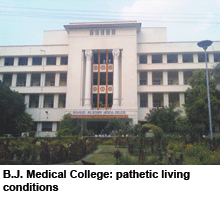One of the well-kept secrets of Indian academia is the abysmal living conditions that higher education institutions — particularly government-run or government depen-dent colleges and universities — offer out-of-town students in their hostels and/or halls of residence. Ten years ago, the general lack of concern for student pastoral care prompted an Education-World special report titled ‘India’s academic slums’ (July 2001) which detailed the terrible living conditions students have to endure — multiple occupancy of cramped rooms, choked sanitation, massive water leakages, poor quality food and generally poor hygiene.
A decade later, not much has chan-ged. In mid-August, local newspapers featured several lurid reports high-lighting the pathetic living conditions in Pune’s Byramjee Jeejeeboy Medical College (BJMC). One of the oldest medical colleges in India, BJMC was promoted in 1879 as the B.J. Medical School and was renamed the B.J. Medical College in 1946. Currently, the college admits 200 students into its undergraduate (MBBS) programme and 130 into its postgrad programmes in pre-clinical (anatomy, physiology, biochem-istry, pathology) and para-clinical (microbiology, forensic medicine, pharmacology, social medicine) streams. At any given time, BJMC has a student headcount of approx. 1,200.
 Significantly, BJMC is ‘attached’ to the state government-run Sassoon General Hospital, which serves the needs of patients of urban and rural Pune and is the college’s teaching hospital. It is here that all BJMC students are obliged to serve as interns for one year prior to being conferred their MBBS degree. Operationalised in 1867 with a generous donation made by Jewish philanthropist Sir David Sassoon (1849-1926), the BJMC complex includes a nurses’ training school, a well-respected childcare centre and orph-anage, apart from the 1,500-bed public teaching hospital.
Significantly, BJMC is ‘attached’ to the state government-run Sassoon General Hospital, which serves the needs of patients of urban and rural Pune and is the college’s teaching hospital. It is here that all BJMC students are obliged to serve as interns for one year prior to being conferred their MBBS degree. Operationalised in 1867 with a generous donation made by Jewish philanthropist Sir David Sassoon (1849-1926), the BJMC complex includes a nurses’ training school, a well-respected childcare centre and orph-anage, apart from the 1,500-bed public teaching hospital.
But while the college is routinely ranked among the top ten medical colleges in the country, living conditions in its hostels — with an intake capacity of 524 men and 302 women students — are pathetic. “We are crammed three-four into small and poorly ventilated rooms. The sanitation systems are clogged most of the time with only one attendant hired to keep them clean. Nor do we have the services of electricians or plumbers and taps leak for days together,” a student informed your correspondent during a visit to the hostels. Appalling residential accommo-dation apart, the academic infrastructure is in no better shape. “The library lacks space and does not offer a conducive environment for study. Books have not been updated for years,” says a postgraduate forensics medicine student.
Typically, the infrastructure of the government-managed Sassoon Hospital is also in a shambles. “The condition of the surgical intensive care unit (SICU) is bad. Some basic drug or the other is always unavailable in SICU. Doctors and interns have to face the wrath of patients and their relatives whenever they are informed about medicine shortages. Moreover, the CT scan machine has been dysfunctional for the past two years. We have to request critically ill patients to get their CT scans done in private clinics. This is an embarrassing situation for all of us,” says an MBBS intern.
Asked to provide reasons for such gross inefficiencies in the system, the hospital’s management directed your correspondent to speak with Vijaykumar Gavit, Maharashtra’s minister for medical education. “We have already made a note of all such grievances at a jansamvad (open dialogue) session held at Sassoon Hospital last month. We are planning to outsource the maintenance of the hostel buildings to a professional agency so that cleanliness and hygiene can be ensured,” says Gavit.
Moreover, a proposal to allot Rs.6 crore for a new CT scan machine has already been submitted to the state government and it will be installed by January 2012. “A proposal to provide health insurance to interns is also under consideration,” adds Gavit.
Unsurprisingly, BJMC students are skeptical about the minister’s assur-ances. “Many such promises have been made in the past and some problems, such as non-functioning machines and vital drugs shortages never get resolved. We will soon complete our internship and the next batch will be offered the same old promises,” comments a disillusioned intern.
Little wonder there’s an unstoppable medical brain drain.
Huned Contractor (Pune)